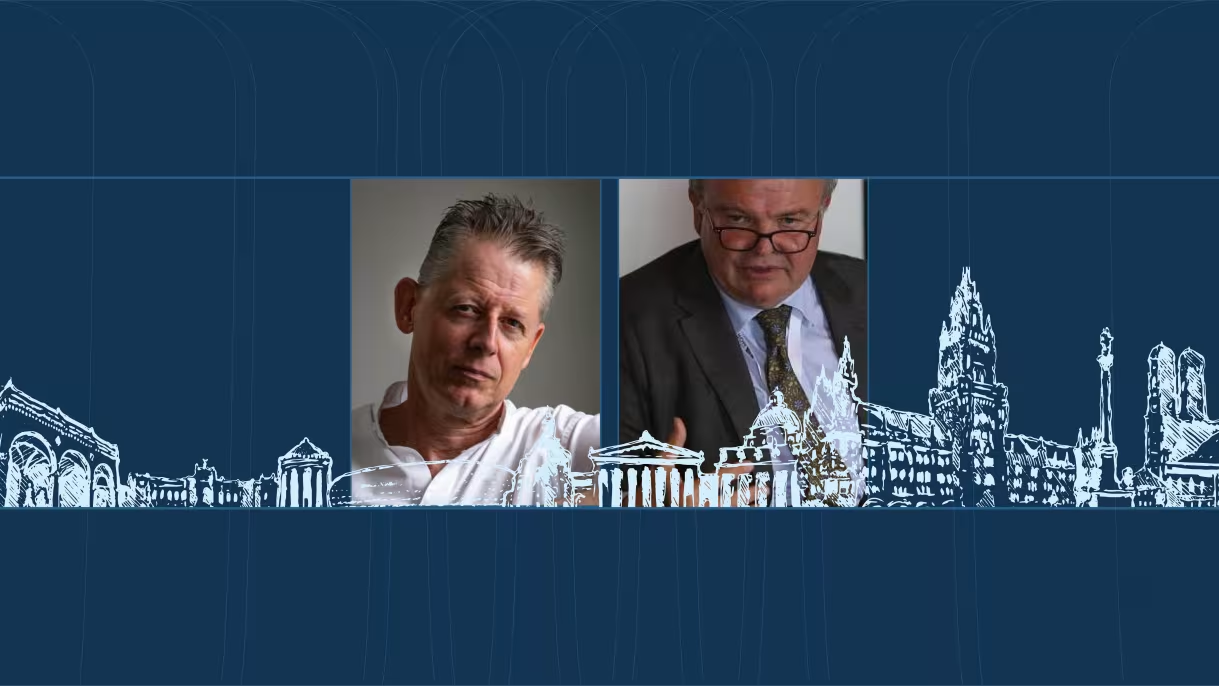

Moravcsik and Danspeckgruber Reflect on the 61st Munich Security Conference
The 2025 Munich Security Conference (MSC), held last month, included representatives from the Princeton School of Public and International Affairs among its observers and participants.
Andrew Moravcsik, a professor of politics and international affairs and director of Princeton SPIA’s Liechtenstein Institute on Self-Determination, was on hand for this year’s gathering. He was among more than 450 high-profile and senior decision-makers as well as thought-leaders from around the world, including heads of state, ministers, leading personalities of international and non-governmental organizations, high-ranking representatives of industry, media, academia, and civil society, who met over three days to discuss international security policy and concerns. In addition, Wolfgang F. Danspeckgruber, LISD’s founding director, was in Munich at the parallel BMW Foundation Energy Security Hub, where he met with various MSC participants and followed the proceedings.
“For 48 hours, Munich was the center of the transatlantic news cycle,” Moravcsik said. “I watched JD Vance get up on the main stage and virulently criticize Europe, then walk out without taking any questions.”
The U.S. vice president raised numerous eyebrows with his remarks, telling European leaders, “The threat that I worry most about vis-a-vis Europe is not Russia, not China, it’s not any other external actor. What I worry about is the threat from within, the retreat of Europe from some of its most fundamental values.”
According to Moravcsik, Vance’s statements were met with disapproval.
“Next to Vladimir Putin’s speech in 2007, which heralded the change to a more assertive Russian foreign policy, it was perhaps the least well-received speech in the history of the conference,” he said.
And while Vance’s controversial remarks garnered considerable attention, it remains to be seen what impact they will have, Moravcsik added.
“As is so often the case with right-wing populist governments in every country — a topic I study — their foreign policy rhetoric gets everyone’s attention even though when remains unclear what policy consequences, if any, it has,” he said.
Saying it “has already become legendary,” Danspeckgruber also compared Vance’s “lecture to the Europeans” to Putin’s 2007 appearance, along with German Vice Chancellor and Foreign Minister Joschka Fischer telling U.S. Secretary of Defense Donald Rumsfeld in 2003 that he was “not convinced” by Rumsfeld’s argument to go to war with Iraq.
Danspeckgruber noted that Vance “did not address urgent external security challenges” including the wars in Ukraine and Gaza and tensions in Africa and northeast Asia “but rather lectured on specifically selected and sensitive domestic matters of key European states.”
“These Euro-domestic issues apparently seem at least as threatening as the other global conflicts for this ‘new sheriff in town,’” he said.
Danspeckgruber also expressed surprise at the absence of several key European leaders, most notably French President Emmanuel Macron and Italian Prime Minister Giorgia Meloni; at a lack of achievements on defense industrial output and cooperation; and at “the continued and widespread absence of the readiness to recognize the harsh reality of critical challenges in the transatlantic relationship,” including a likely reduction of U.S. involvement in Europe at the same time the BRICS+ nations increase their involvement in the region.
He also contrasted the testiness of Vance’s speech with the “very different and cooperative tone” of remarks made by the Chinese foreign minister and noted the “outstanding regional cooperative behavior and presence by the Baltic and Nordic states.”
“While much discussion is spent on AI and disinformation,” Danspeckgruber said, “little is done to earnestly and effectively deal with today’s real security challenges facing Europe now — the greatest challenges since 1945.”
Both Moravcsik and Danspeckgruber have attended multiple MSCs over the years, engaging with attendees in a variety of ways. Moravcsik, for example, chairs the committee that awards the John McCain Award for Academic Excellence, given annually for the best Ph.D. dissertation on transatlantic relations written over the past 18 months. He also participated in invitation-only events organized by a range of think tanks, European universities, NGOs, journalistic outlets, private-sector groups, diplomats, and the conference itself.
“The formal events are not really what MSC is about,” he added. “More than attending some events as a spectator, for most people at events like these, the really valuable thing is ‘bilats’: meetings one-on-one with people or small groups, or dinners off-site. It’s by far the largest and most prestigious such meeting in the transatlantic space every year — and is 60-plus years old — so it’s unique for that purpose, allowing one to catch up on what’s happening, exchange views, and meet new people.”

